Drug and Alcohol Abuse Prevention Program (DAAPP)
DAAPP
Drug-Free Schools and Campuses Regulations Biennial Review: Academic Years 2018-2020
University of Utah Alcohol & Drug Policy
The federal Drug-Free Schools and Campuses Act requires institutions of higher education to have a drug and alcohol abuse prevention program (DAAPP). Written policy which describes: 1) legal sanctions under federal, state, and local law for the unlawful use, possession, or distribution of illicit drugs and alcohol; 2) a description of the health risks associated with the use of illicit drugs and the abuse of alcohol; 3) a description of any drug and alcohol programs that are available to employees or students; and 4) a clear statement that the school will impose disciplinary sanctions on students and employees for violations of the standards of conduct.
Legal Sanctions: Federal, State, Local Law
Federal and Utah State laws prohibit the use of illicit drugs and actions related to the abuse of alcohol. Summarized below are the general federal and state laws relating to drugs and alcohol.
Federal
For federal drug trafficking penalties go to: https://www.dea.gov/sites/default/files/drug_of_abuse.pdf#page=30 and see table below)
In 1984, the National Minimum Drinking Age Act (Public Law 98-363) was passed. For more information go to: https://alcoholpolicy.niaaa.nih.gov/the-1984-national-minimum-drinking-age-act
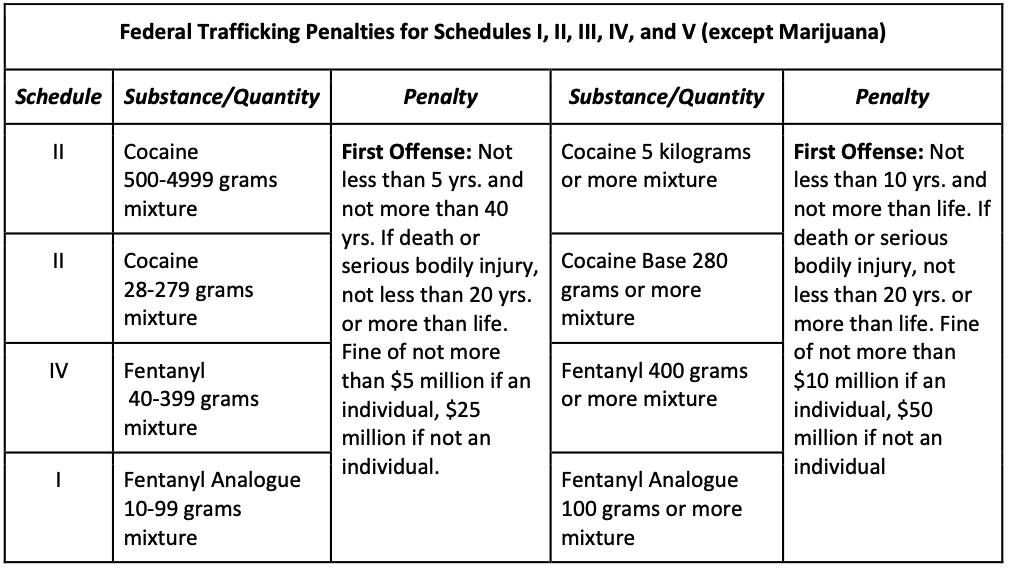
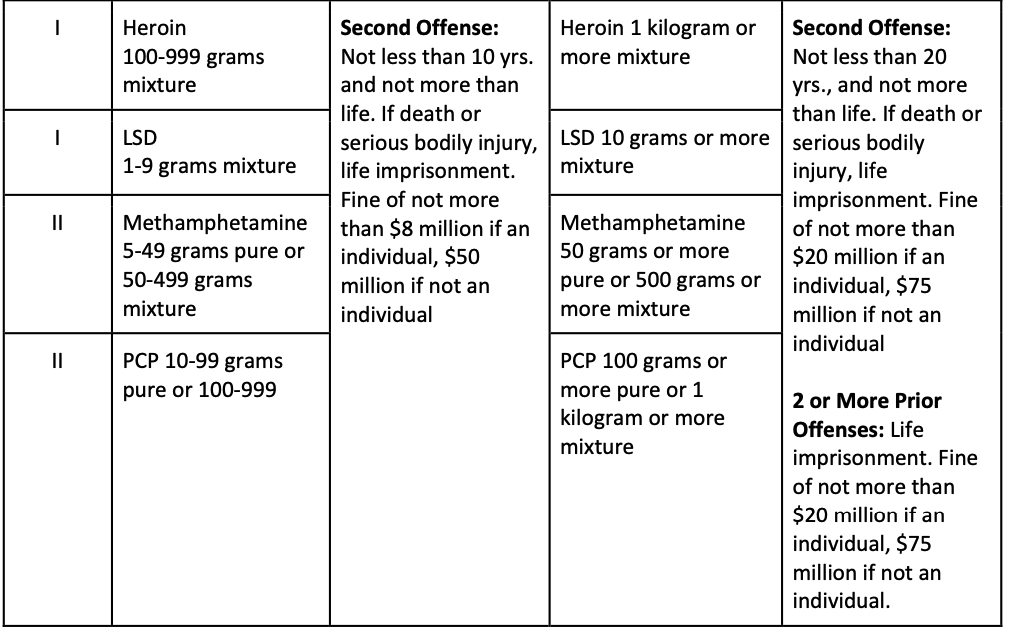
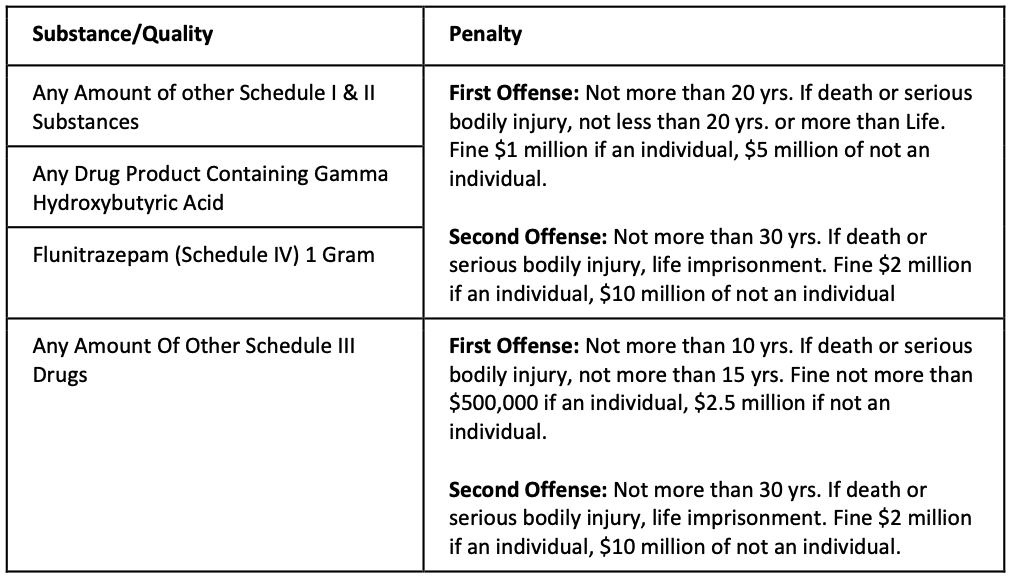
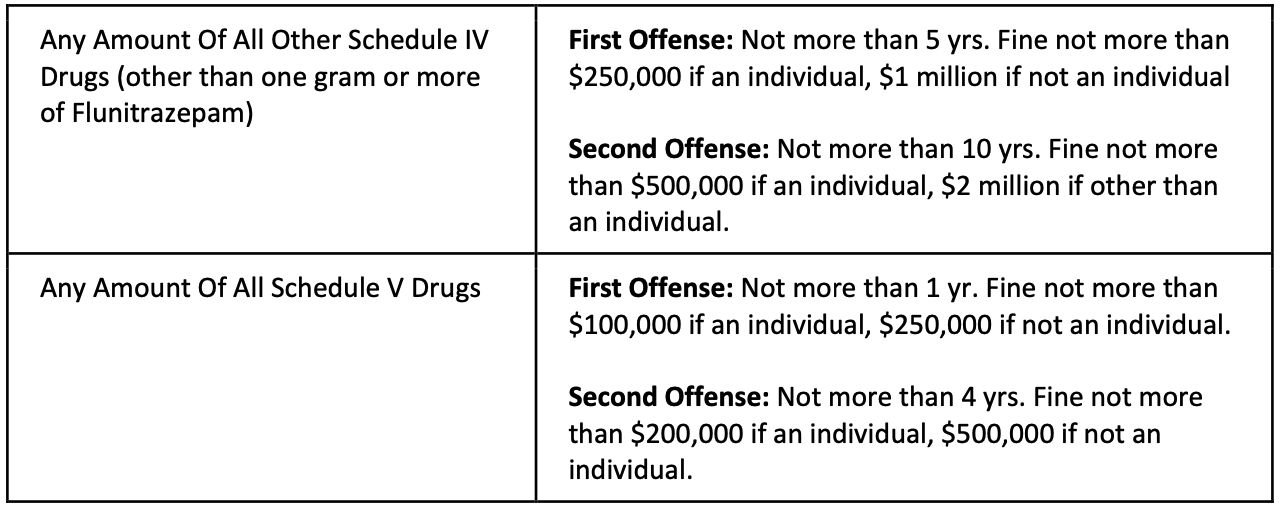
Federal Trafficking Penalties – Marijuana
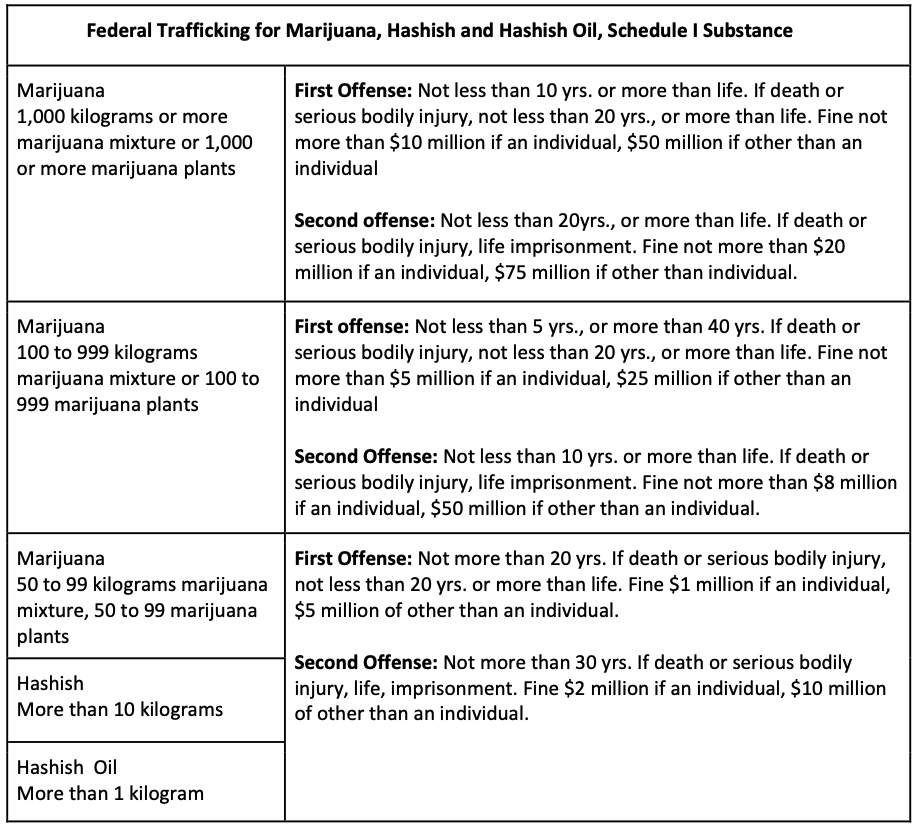
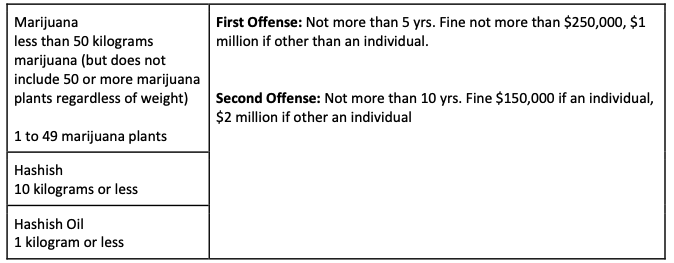
State
Utah laws prohibit the possession and distribution of controlled substances, which are defined in Utah’s statutes and include such drugs as marijuana, heroin, cocaine and prescribed medications. See Utah Code Ann. § 58-37-4 for a listing of controlled substances.
In Utah, it is unlawful to produce,manufacture and/or dispense a controlled substance. Violation of this law may result charges running from a class A misdemeanor to second degree felony depending upon the type of controlled substance and the circumstances of the crime. Utah Code Ann. § 58-37-8(1).
It is unlawful in Utah possess or use a controlled substance except pursuant to a valid prescription. Violation of this law may result in charges running from a class B misdemeanor to second degree felony depending upon the quantity of drugs within the individual’s possession. Utah Code Ann. §58-37-8(2).
It is class B misdemeanor in Utah to use or possess drug paraphernalia. Utah Code Ann. § 58-37a-5.
Penalties for drug violations in Utah may include incarceration for certain periods of time and fines ranging from $750 to $10,000 depending upon the nature and circumstances of the offense. Utah law provides for enhanced penalties and charges if the drug violations occur on a college campus.
For more information about Utah drug laws, visit: https://le.utah.gov/xcode/Title58/Chapter37/58-37-S8.html
Utah law prohibits minors under the age of 21 from consuming alcohol. Utah Code Ann. § 32B-4-409. A violation of this law will result in the suspension of driving privileges.
It is also unlawful in Utah to sell or distribute alcohol to a minor Utah Code Ann § 32B-4-403. Violation of this law is a class A or B misdemeanor.
For more information about Utah’s alcohol laws, visit:
https://le.utah.gov/xcode/Title32B/32B.html?v=C32B_1800010118000101
Utah law prohibits driving while under the influence of alcohol. Utah Code Ann. §41-6a-503. Violations of this law may result in a class B misdemeanor to a third degree felony depending upon the circumstances. Driving under the influence will also result in the suspension or revocation of a driving license.
Health Risks
The use of any illicit drug or abuse of alcohol is potentially hazardous to your health. Faculty, staff, and students should evaluate the health risks associated with use of illicit drugs or abuse of alcohol. Synthetically produced drugs may contain impurities and the true amounts and ingredients are rarely known. The effects of a drug may be significantly different with each use.
The U.S. Drug Enforcement Administration states: “The illegal importation, manufacture, distribution, and possession and improper use of controlled substances have a substantial and detrimental effect on the health and general welfare of the American people.”
The National Institute of Alcohol Abuse & Alcoholism (NIAAA) provides comprehensive information and resources associated with alcohol abuse. Some of the major health risks of alcohol abuse include alcohol dependence, lasting effects on the brain, violence and injury, and suicide. Visit www.niaaa.nih.gov for more information. For college students in particular, visit www.collegedrinkingprevention.gov.
Health risks associated with other drugs are indicated in the following table:
(Visit https://www.dea.gov/factsheets for more specific drug information)
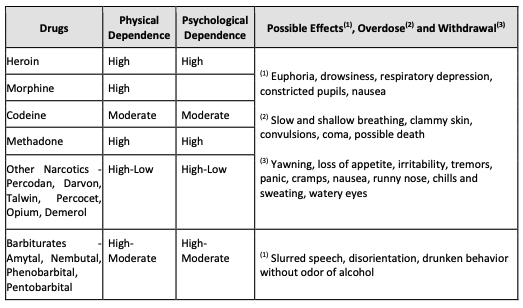
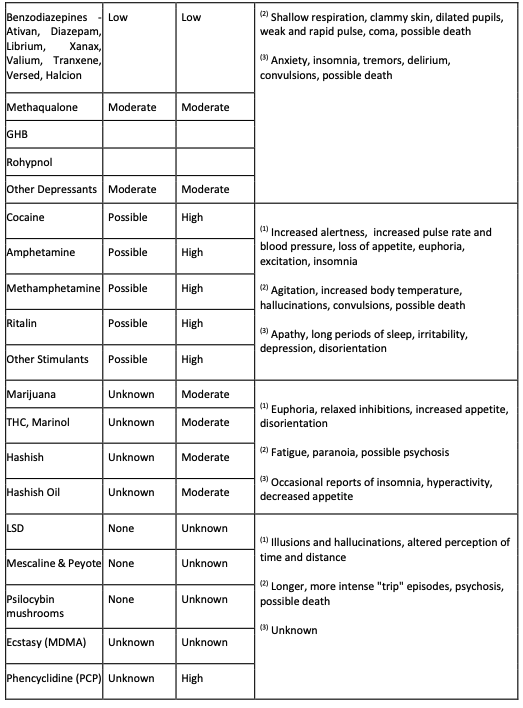
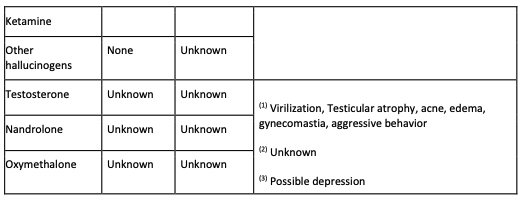
University of Utah Policy: Student Code of Conduct
University Policy 6-400 is the Code of Student Rights and Responsibilities (“Student Code”) and can be found in its entirety at https://regulations.utah.edu/academics/6-400.php.
Section III of the Student Code governs student behavior on campus. The Student Code specifically prohibits the “Use, possession or distribution of any narcotic or other controlled substance on University premises, at University activities, or on premises over which the University may has supervisory responsibility pursuant to state statute or local ordinance, except as permitted by law and University regulations.” Policy 6-400, Section 3(A)(8).
The Student Code also prohibits the “Use possession or distribution of alcoholic beverages of any type on University premises except as permitted by law and University regulations.” Policy 6-400, Section 3(A)(9).
The Student Code also prohibits the “Violation of federal, state or local civil or criminal/laws on University premises, while participating in University activities, or on premises over which the University has supervisory responsibility pursuant to state statute or local ordinance.” Policy 6-400, Section 3(A)(9).
Violation of the Student Code may result in one or more of the following sanctions:
- Warning, probation, educational requirement, restriction of privileges, parental notification, clinical assessment, eviction from on campus housing, suspension or dismissal.
Since a variety of factors must be considered when sanctioning, sanctions may be increased or decreased at the discretion of University personnel responsible for administering the Student Code. Factors affecting the imposition of sanctions include such issues as the severity of the incident, impact upon other individuals or the community, and previous behavioral conduct. The matrix below represents examples of actions that could be or are typically taken with students who violate the Student Code regarding alcohol and drug use on campus. Local, state, and federal laws may also apply to alcohol and drug violations.
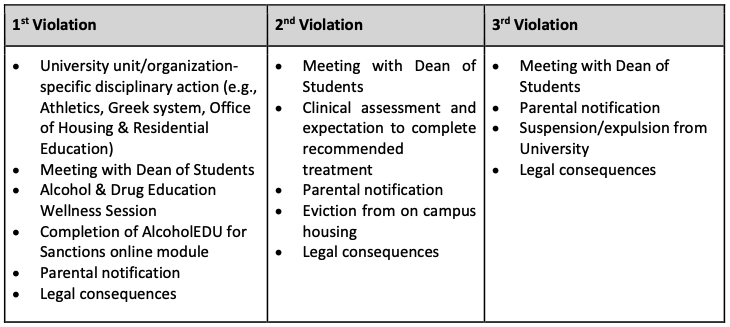
Faculty and Staff Policy and Discipline
University Policy 5-113 is the University’s Drug Free Workplace Policy. This Policy in its entirety can be found at https://regulations.utah.edu/human-resources/5-113.php and provides:
A. It is University Policy to maintain a drug-free workplace. It shall be a violation of this policy for employees to engage in the unlawful manufacture, distribution, dispensation, possession and/or use of a controlled substance or alcohol at a university workplace, or while engaged in university business off campus.
B. Any person accepting employment with the university agrees to abide by the terms of this policy and procedure. .
The University’s Code of Faculty Rights and Responsibilities (“Faculty Code”) expressly recognizes: “Faculty members may also be subject to discipline for violation of the Drug-Free Workplace Policy (Policy 5-113) and the Field Trip Policy (Policy 10-003) in accordance with the procedures described in those policies. Policy 6-316, Section 4(8).
Sections 5 and 6 of the Faculty Code outline the sanctions and procedures for imposing faculty discipline for violations of the Faculty Code. Discipline may include a range of sanctions including a written reprimand, suspension or dismissal. Policy 6-316, Sections 5 & 6.
Staff employees may be disciplined for violating any University policies. Utah Policy 5-111 and Rules 5- 111A and 5-111B outline the process for imposing University discipline for violation of workplace policies and standards. University Rule 5-111C recognizes that violations of the Drug Free Workplace rules may pose particular risks to the University community. It defines as “egregious behavior” the “Use, being under the influence or possession of alcohol in violation of the University's Alcohol relatedpolicies 3-192, 5-113 and 5-114; or illegal use of drugs and/or being under the influence of illegal drugs while on University property or when engaged in University business and when such conduct poses a serious threat of harm to people, property and/or resources of the University.” Egregious behavior may result in termination upon one instance of misconduct. Rule 5-111C.
Any employee of the University who violates the Drug Free Workplace policy may be required to participate in a drug or alcohol abuse assistance or rehabilitation program approved by the director of human resources in accordance with federal law.
